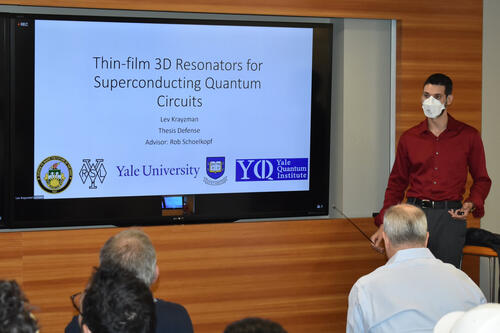
On August 15, 2022, Lev Krayzman successfully defended the thesis: “Thin-film Resonators for Superconducting Quantum Circuits” (advisor: Rob Schoelkopf).
Krayzman explained: “Quantum computing is believed to be able to solve certain kinds of problems much faster than classical computing. One of the leading platforms for quantum computing is superconducting circuits. Quantum information can be encoded for protection against errors in superconducting resonators. Current experiments use only a few a handful of such devices; going to larger numbers requires a re-design of the hardware. In my graduate studies, I have worked on different designs that aim to improve the scalability of the system without sacrificing other desirable properties, such as time for which the information can be stored.”
Krayzman will be joining Princeton University as a Post-Doctorate Student.
Thesis Abstract:
Quantum computing has garnered a lot of attention due to the belief that it would be able to solve certain kinds of problems which are intractable to classical computers. One of the leading candidate platforms for quantum computing is superconducting circuits. Within this platform, there are two main methods of storing quantum information: Josephson-junction based artificial atoms (for example, transmons), and harmonic oscillators. The large Hilbert space of the bosonic excitations of a harmonic oscillator allows for redundant storage of quantum information. Quantum error correction in a single mode using bosonic codes has been demonstrated beyond break-even. However, using more than a handful of devices requires re-designing the hardware. In this talk, I shall discuss ways to improve the scalability of harmonic oscillators without sacrificing their coherence times, and present recent results on hybrid resonators.